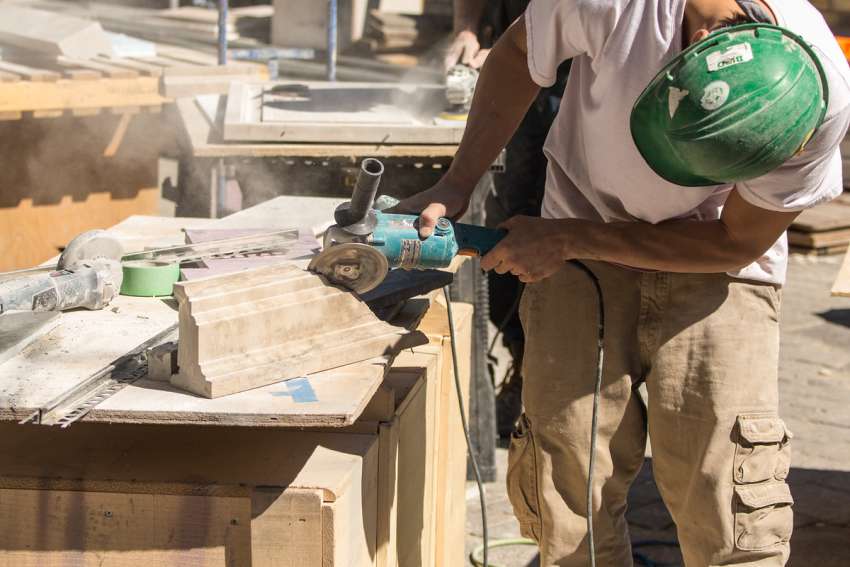Work and workers have also formed Grogan in his Catholic faith.
“Jesus as well as St. Joseph were workers — a reality very often overlooked. Furthermore all of the Apostles were fishermen, again members of a labouring class, one controlled by Imperial Rome,” Grogan told The Catholic Register in an email.
As a former teacher, one of the ways Grogan connects with St. Joseph is the idea of Joseph as the master carpenter who led Jesus through His apprenticeship, teaching Him the importance of doing things right, of care and attention on the job, instilling pride in the skills to be mastered.
To go along with St. Joseph’s life as a humble builder, Grogan came to understand Mary as a woman who came up from poverty. He saw that Jesus grew into manhood in the context of work and struggle.
So, come March 19, Grogan’s prayers and imagination will turn again to St. Joseph the Worker.
“Giving some attention to St. Joseph as a worker, I think it is really a commendable kind of objective,” Grogan said.
Pope Pius XII declared the humble, silent carpenter of the Gospels the patron saint of workers in 1955, when Grogan was a scholarship student at St. Michael’s College. At the time, as the Soviet Union became firmly entrenched as a world power and Marxist ideals were sweeping across young nations, Pope Pius boldly declared the feast of St. Joseph the Worker would be May 1, the same day workers and communists marched through European capitals parading banners to celebrate International Workers’ Day.
But St. Joseph already had a feast day, March 19, when all the aspects of St. Joseph as patron saint of the Universal Church, of fathers, expectant mothers, immigrants, engineers, tradespeople, the sellers of houses (leading to the practice of burying an upside-down statuette of St. Joseph in the front yard to sell the house faster) and, not least, principal patron saint of Canada can be celebrated.
As the saint most associated with workers and work, St. Joseph opens the way to a spirituality of work. That’s a spirituality particularly important to members of Opus Dei, like Isabelle Saint Maurice.
“Work is like our daily food,” Saint Maurice explains. “Whoever is working in the world, with whatever work, can do the same thing as St. Joseph — giving life to the mission that God gave humankind. The spirituality of Opus Dei is that we have been created to work. God wanted humankind to be happy in work.”
Whether working at a desk, at a sewing machine or on a construction site, members of Opus Dei understand their place of work as an altar.
“We sanctify the work, because work takes the importance of being an offering to God,” said Saint Maurice.
An attitude to work shaped by faith is very different from thinking of work as a transaction — X amount of drudgery and boredom in exchange for a weekly paycheque. St. Joseph helps Saint Maurice understand work differently.
“Joseph was involved in his daily work, giving himself to his daily work. For us in Opus Dei, work doesn’t bring us to be sad because of the fatigue, because of the effort we have to put in,” Saint Maurice explained. “We are collaborating in the redemption, giving to God the talents He gave to us, to love Him.”
An American transplanted to Montreal during COVID, St. Joseph’s Oratory Rector Fr. Michael Delaney has been thinking about the ways in which St. Joseph is the right patron saint for Canada — how he fits with Canada’s character and history. The association between St. Joseph and honest toil isn’t irrelevant to Canada’s story, said Delaney.
Canada was built with the hard work of ordinary people, and that has been celebrated at St. Joseph’s Oratory ever since the enormous shrine was a construction project in the middle of the Great Depression.
“All kinds of unions used to come here on Labour Day,” said Delaney. “He was seen as the patron saint of workers and when you think about it, that’s what makes Canada run.”
But Delaney also associates St. Joseph with Canada’s history as an immigrant nation — a country that has received wave after wave of people fleeing war, poverty and oppression. Like St. Joseph taking his young vulnerable family in the middle of the night on a perilous journey to Egypt, millions of Canadians have a refugee story somewhere in their family history.
“I think he’s kind of that figure for all people,” said Delaney.
In the modern, multicultural and multifaith context of Canada, St. Joseph speaks to all cultures and all faiths, said the Holy Cross Father. In his time at the Oratory, Delaney has greeted Hindus, Muslims and people of no faith who come in admiration of this image of constant, faithful fatherhood.
“Muslims, you know, consider Jesus a prophet and they consider the father of Jesus very important,” he said. “So I think St. Joseph can pertain to all different religions and faiths as a kind of protective father and a revered father.”


